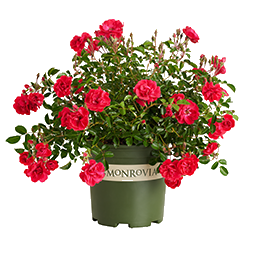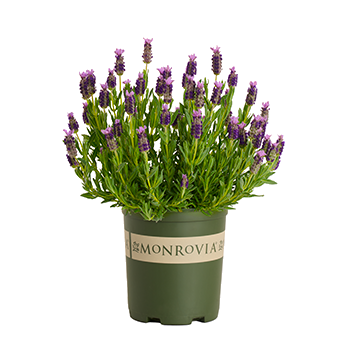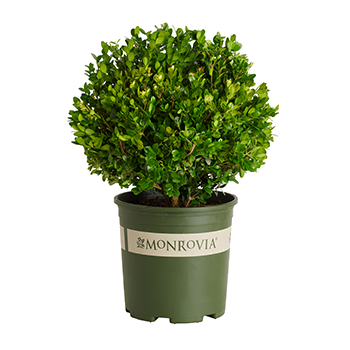Heuchera, commonly known as "coral bells," offers numerous benefits that make it an excellent addition to any garden in Zones 4-9. These easy perennials are highly adaptable and thrive in a wide range of climates and conditions, making them ideal for various garden settings. They tend to be low-maintenance and relatively drought-tolerant once established, making them an easy choice for busy gardeners.
Their exceptional range of leaf colors, including vibrant shades of red, purple, green, and amber, adds year-round visual interest and diversity to garden beds and containers. Heuchera's foliage is often ruffled or variegated, further enhancing its appeal.
Now, with foliage in full view so you can easily see the color, is a great time to plant some heuchera. Here are our top 10 favorites for color, texture, and easy-care containers. Each of these is happy in Zones 4–9.
Plus, take a look further down for our favorite coral bell companions and care tips!
(Above) Ruby Tuesday Heuchera
The leaves of this plant emerge in a striking ruby red, displaying an exceptionally ruffled appearance. As they age, they transition to a deep merlot with a beautiful silver frost. During early spring, abundant, petite white flowers bloom. Whether used as an accent piece or planted en masse in a woodland border, this plant adds a captivating touch. Partial shade to full sun. Up to 9" tall, 14" wide. Zones 4-9.
Best Colorful Heuchera (Coral Bells) Varieties
Yellow, Amber and Orange Heuchera
Northern Exposure™
Sienna Heuchera
Long-lived, hardy, and rust-resistant, this perennial adds a pop of color to a shady garden. New leaves emerge green, then transform in summer to burnt orange with yellow edges. Bright-pink flowers bloom in spring. Partial shade to full sun. Up to 13" tall, 21" wide. Zones 4-9.
Northern Exposure™
Amber Heuchera
Brilliant, amber-colored, rounded leaves with fluted edges form a tidy, dense mound accented with sprays of small greenish-yellow flowers. Superb, long-lasting foliage, rust resistance, and longevity due to hardy parentage. Full shade to full sun. Up to 14" tall, 20" wide. Zones 4-9.
Red Heuchera
Northern Exposure™
Red Heuchera
Bold burgundy-red rounded leaves with fluted edges form a tidy, dense mound accented with sprays of small greenish-yellow flowers. Superb, long-lasting foliage, rust resistance, increased sun tolerance, and longevity due to hardy parentage. Full shade to full sun. Up to 14" tall, 20" wide. Zones 4-9.
Forever® Red
Heuchera
The reddest foliage to be found, with intensely colored, incised, lightly ruffled leaves on deep red stems. Foliage color is most intense in the cooler spring and fall months. Showy sprays of tiny pink buds open to white flowers in midsummer. Full shade to partial sun. Up to 7" tall, 14" wide. Zones 4-9.
Balboa Sunset®
Heuchera
Dark cool-green and purple leaves with lovely wavy edges grow upright, showing off their wine-red undersides. Short and compact; perfect for containers or the front of perennial beds. Partial sun. Up to 7" tall, 14" wide. Zones 4-9.
Dark-Purple Heuchera
Forever® Purple
Heuchera
Unfaltering color, with intensely purple, glossy foliage with fluted edges. Produces short airy sprays of small soft violet-colored flowers on deep-purple stems from late spring through summer. Outstanding color for borders, rock gardens, and mixed containers. Full shade to full sun. Up to 12" tall, 22" wide. Zones 4-9.
Sirens' Song™ Dark
Night Heuchera
This is a mesmerizing new coral bells variety exclusive to Monrovia. Its foliage boasts a captivating deep, dark purple-red that is surprisingly tolerant of sunlight. Magnificent sprays of reddish-pink blooms open in late spring, enticing hummingbirds. The ruffled purple-red leaves bring a stunning depth to gardens and mixed containers. Partial shade to partial sun. Up to 18" tall, 15" wide. Zones 4-9.
Obsidian
Heuchera
Stunningly black, shiny, rounded leaves hold their color all season. The compact, mounding form offers great opportunities in small urban gardens. Plant en masse to intensify the dramatic color effect. Very striking when paired in pots with high-contrast companions, like green hostas and ferns. Up to 10" tall, 16" wide. Partial to full sun. Zones 4-9.
How to Grow Heuchera (Coral Bells)
Typically unfussy and easy to grow given afternoon shade in the hottest regions. Herbaceous perennial, in colder zones they’ll die back in the late fall and come back in spring. Evergreen in warmer zones.
- Partial to full sun.
- Provide a rich, well-drained soil and water.
- Fertilize regularly throughout the growing season.
- Provide partial shade in hottest summer regions.
- For a neat appearance, remove old flower stalks.
- Divide clumps every 2 to 3 years in early spring.
- Pruning time: early spring.
Favorite Companion Plants for Heuchera


Ferns
Jurassic™ Pterodactyl
Eared Lady Fern
Add airy, feathery texture to a shady spot with the arching fronds of this clump-forming fern. Pale green fronds unfurl from red stems, creating a two-toned look with the older, dark-green foliage. Excellent in a woodland garden combined with bold-leaved plants such as hostas and brightly colored heucheras. Partial to full shade. Up to 18" tall and wide. Zones 6-9.
Hellebores
Ice N' Roses®
Rosado Hellebore
This impressive new hybrid has perked up the traditional drooping flowers of hellebores with blooms facing outwards, and even upwards, to greet the spring. A delightful cool-season bloomer, a wonderful addition to lightly to deeply shaded beds. Partial shade to partial sun. Up to 2' tall and wide. Zones 5-9.
Hostas
Blue Angel
Hosta
The largest of the blue hostas with pointed, silver-blue leaves forming a lush, dense, cascading mound. White, bell-like flowers on tall stems adorn the huge clump in summer. Sure to attract attention in the dappled shade garden. Full shade to partial sun. Up to 3' tall, 6' wide. Zones 3-9.
Learn More About Adding Fall and Winter Interest to Your Garden
- Sign up for our Grow Beautifully newsletter. Here you'll get more design inspiration, garden tips, how-tos, and first access to exclusive plants.
- 10 Plant Palettes to Perk Up Your Late-Season Containers and Borders
- Best Small Trees for Fall Color
- Plant a Halloween Window Box
- How to Grow St. John's Wort and a Closer Look at FloralBerry®
- Top Tips to Select the Right Japanese Maple
- Make an Impact with These Unusual Types of Japanese Maples
- Fresh Plant and Color Combos for Fall Container Gardens
- Late Summer and Fall-Blooming Perennials for Long-Lasting Color
- Brighten Your Early Fall Shade Garden with These Plants
- Growing Gold: Light up your landscape with yellow trees and shrubs
- Grow fuss-free: 12 container garden ideas for fall into winter
- The Best Dwarf Conifers Offer Big Solutions


















Please login to comment.
Don't have an account?
Sign Up for free